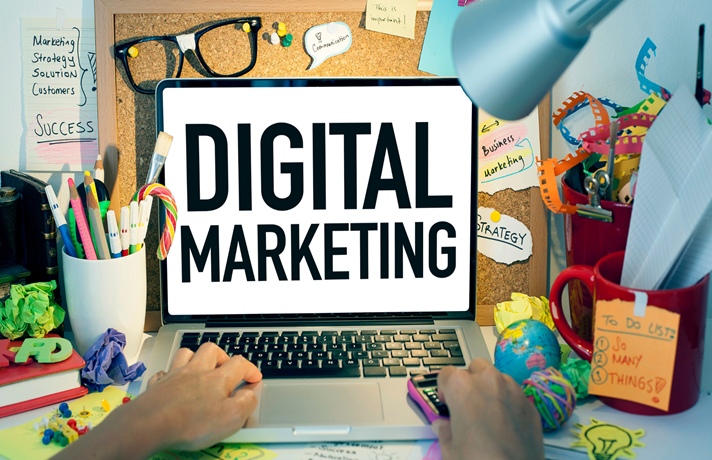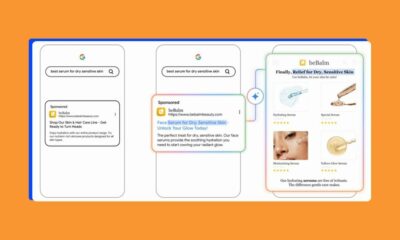MARKETING
10 Tell-Tale Signs You Need to Get a New Digital Marketing Consultant

Are you feeling lost when it comes to digital marketing? Are you not seeing the results you expected? If so, it might be time to get a new digital marketing consultant. An excellent digital marketing consultant can help take your business to the next level and achieve your desired results. This blog post will discuss ten tell-tale signs indicating you need a new digital marketing consultant. Keep reading to learn more!
1. Your website is outdated and doesn’t reflect your brand well
One of the most critical aspects of your online presence is your website. It’s the first thing potential customers will see when searching for your business, and it needs to make a good impression. If your website is outdated or doesn’t reflect your brand well, it’s time to find a new digital marketing consultant.
If you’re unsure whether your website needs an update, look at some of the other websites in your industry. If you’re noticeably behind the times, it’s time to invest in a new site. Similarly, if your website is poorly designed or hard to navigate, it could be turning people away. Don’t let a bad website cost you business – if you’re not happy with yours, it’s time to make a change.
A good consultant will help you create a modern, responsive website that accurately reflects your brand and showcases your products or services. They’ll also work with you to improve your search engine optimization and ensure that your website is easy to find online. Don’t settle for a website that doesn’t reflect your business in the best light – invest in a quality digital marketing consultant to get the best results.
2. Your social media accounts are stale and not generating much engagement.
In today’s digital world, social media is one of the most powerful tools businesses have at their disposal. When used correctly, social media can help build brand awareness, drive traffic to your website, and generate leads and sales.
For example, if your social media accounts are stale and not generating much engagement, it could be a sign that your consultant is not up to date on the latest trends. Additionally, it may be time to ask for a new strategy if you do not see any results from your marketing efforts.
If you feel like you are not getting the attention you deserve from your consultant, it may be time to look for someone more responsive. By watching these signs, you can ensure that you are getting the most out of your digital marketing efforts. Remember that an excellent digital marketing consultant will help you develop fresh content ideas that will resonate with your target audience and help you grow your social media following.
3. You’re not seeing an increase in website traffic or leads
If you’re not seeing an increase in website traffic or leads, it’s possible that your current consultant isn’t using the most effective strategies. Additionally, if your campaign budget is consistently being exceeded without seeing any corresponding results, it’s time to reevaluate your consultant’s effectiveness.
If you find that you regularly have to explain your business goals and target audience to your consultant, likely, they don’t have a strong understanding of your brand. It’s essential to ensure that your consultant keeps up with the latest trends and uses the best tools to reach your target audience. Otherwise, you’ll be stuck with flatlined website traffic and leads.
Website traffic and lead generation are important metrics to consider when gauging the success of your digital marketing campaign. If you do not see an increase in either of these areas, it may be time to seek a new digital marketing consultant.
4. Your Google AdWords campaigns aren’t performing as well as they used to
If your Google AdWords campaigns aren’t performing as well as they used to, it could be a sign that your consultant doesn’t understand the latest algorithm changes or isn’t up to date on the latest best practices. Here are possible explanations for why this might be happening:
- Your target market has changed: If your target market has changed, your current digital marketing strategy may be no longer effective. For example, if you’re targeting a new demographic, they may not be using the exact keywords as your previous target market. As a result, your ads may not appear in search results.
- Your competitors have changed their strategies: If your competitors have changed their digital marketing strategies, they may be outperforming you. It’s essential to keep up with the latest trends and ensure that your campaigns are as effective as possible. Otherwise, you risk being left behind.
- You’re not keeping up with industry changes: The digital marketing world is constantly changing. What worked last year might not work this year. If you’re not keeping up with the latest changes, you could be missing out on new opportunities to reach your target market. Additionally, you may not be aware of new regulations or guidelines
- Your cost per click is rising: This is one of the most important metrics to track regarding AdWords. If your cost per click is rising, your campaigns are becoming less effective over time.
- Your click-through rate is falling: Another essential metric to track is your click-through rate (CTR). It measures the percentage of people who see your ad and then click on it. If your CTR is falling, it means that fewer people are finding your ad relevant or interesting.
- Your conversion rate is unchanged: A third key metric to track is your conversion rate, which measures the percentage of people who take the desired action after clicking on your ad (such as making a purchase). If your conversion rate isn’t increasing over time, your campaigns aren’t effectively driving results.
- You do not see consistent results: Finally, if you’re not seeing consistent results from your AdWords campaigns month after month, it could be a sign that you need to make some changes. Perhaps your campaigns are too narrowly focused, or you’re not using the right keywords. Whatever the case, it’s important to experiment and make adjustments until you find what works.
By working with someone up-to-date on the latest trends and best practices, you can ensure that your campaigns are as effective as possible.
5. You’ve stopped receiving monthly reports or updates from your consultant
If you’re not receiving regular reports or updates from your digital marketing consultant, it could be a sign that they’re not keeping up with your campaign. It is a problem because it means you’re not getting the information you need to make informed decisions about your marketing strategy. It also means that your consultant may not be monitoring your campaign closely enough to identify and fix problems.
As part of their role, your consultant should be providing you with monthly reports detailing the work they’ve done and the results they’ve achieved. These reports should give you a clear understanding of how your marketing campaign is performing and whether or not it’s meeting your goals.
If you’re no longer receiving these reports, it could mean that your consultant has become lax in their duties. In this case, it’s important to discuss with your consultant to find out what’s going on and see if they can turn things around. If you’ve stopped receiving reports or updates, ask your consultant why. If they can’t provide a satisfactory answer, it may be time to find a new one.
6. You’re not happy with the level of customer service you’re receiving.
As a business owner, you understand the importance of customer service. After all, happy customers are essential for any company’s success. Therefore, if you’re not pleased with the level of customer service you’re receiving from your digital marketing consultant, it’s time to make a change.
A good consultant should always be responsive to your needs and concerns, and they should take the time to answer any questions you have. If you find yourself repeatedly waiting for a response or being left in the dark, it’s time to find someone new. Good customer service is essential for a successful partnership, so don’t settle for anything less.
7. You’re not utilizing email marketing or other list-building strategies
Email marketing is one of the most cost-effective ways to reach potential customers. With a well-crafted email campaign, you can build relationships with potential customers and drive conversions. However, if your consultant isn’t utilizing this powerful tool, you’re missing out on a vital opportunity to grow your business.
In addition to email marketing, list-building strategies such as lead magnets can be highly effective in driving conversions. You can quickly build a database of potential customers by offering something of value in exchange for an email address. Again, if your consultant isn’t utilizing these strategies, you’re missing out on a valuable opportunity to grow your business.
Finally, it’s important to remember that the goal of any digital marketing campaign is to drive conversions. If your consultant isn’t focused on driving conversions, they’re not doing their job correctly.
8. Your website isn’t ranking highly in search engine results pages (SERPs)
Any business that wants to succeed online must ensure its website ranks highly on search engine results pages (SERPs). After all, if potential customers can’t find your site, they can’t buy your products or services. Many factors go into achieving a high ranking, and it can be challenging to keep up with the latest changes. It is where a digital marketing consultant comes in. A good consultant will deeply understand how search engines work and what it takes to rank highly.
It means potential customers cannot find your site when searching for keywords related to your business. Another possibility is that your website is not mobile-friendly, which is important because more and more people are using their smartphones to browse the internet. If your website is not optimized for mobile devices, you’re missing out on many potential customers. So, if your website isn’t performing as well as you’d like, it may be time to hire a new consultant.
9. You feel like you’re being overcharged for services that aren’t good at delivering results.
The feeling of being overcharged is a common one when it comes to service providers. When we’re not getting the expected results, it’s easy to feel like we’re being taken advantage of. If you feel like you’re not getting what you paid for, have a conversation with your service provider. See if any adjustments can be made to help you feel more satisfied with your results. Overall, if you’re paying more than you feel comfortable with, or if you feel like you’re not getting value for your money, it’s time to look for a new consultant.
10. You’re not getting the level of service you need
It can manifest in a number of ways, such as not getting timely responses to your inquiries or feeling like your concerns are falling on deaf ears. If you don’t feel like your consultant is genuinely invested in your success, it may be time to look for someone new. Why? Because at the end of the day, you need to be confident that your consultant has your best interests at heart and is committed to helping you reach your goals. When that isn’t the case, it isn’t easy to maintain a productive working relationship.
What To Look For In A Digital Marketing Consultant
There are many digital marketing consultants available today. However, not all of them are created equally. When you are looking for a consultant, you need to make sure that you find one who is experienced and has a proven track record. Here are some things to look for in a digital marketing consultant:
Experience
Experience should be one of your top criteria when looking for a digital marketing consultant. A digital marketing consultant with years of experience will deeply understand the various digital marketing channels and how to use them most effectively. They will also be well-versed in the latest digital marketing trends and technologies. In addition, an experienced digital marketing consultant will have a proven track record of helping businesses achieve their marketing goals.
Proven Track Record
A good way to gauge a consultant’s track record is to ask for references from previous clients. These references should be able to attest to the consultant’s ability to deliver results. If a consultant cannot provide references, that should be a red flag. Also, check out the consultant’s website and social media accounts to see what kind of work they’ve done in the past.
If the consultant has little to no online presence, that’s another cause for concern. The bottom line is that you want to work with a digital marketing consultant with a proven success track record. Otherwise, you could waste time and money on someone who doesn’t know what they’re doing.
Knowledgeable
An excellent digital marketing consultant should know various topics, including SEO, social media, email marketing, and content marketing. They should also be up-to-date on the latest trends and developments in the digital marketing landscape.
Creative
A digital marketing consultant is a creative professional who helps businesses craft and executes effective online marketing campaigns. The role of a digital marketing consultant is to understand the client’s business goals and objectives and then create a plan to help them achieve these goals.
It may involve developing a new website, optimizing an existing website for search engine ranking, or managing a social media campaign. Whatever the project, the goal is always to produce results that meet the client’s needs. When choosing a digital marketing consultant, it is essential to look for someone who is creative and has a track record of producing successful campaigns.
A good way to assess this is to ask for case studies or testimonials from previous clients. Choosing a consultant who understands the latest digital marketing trends and technologies is also important. With so many changes taking place online, it is vital to partner with someone who can keep your business ahead of the curve.
Flexible
A digital marketing consultant should be flexible in their approach to helping companies. They should be willing to try new things and adapt to the ever-changing digital marketing landscape.
Affordable
A digital marketing consultant should be affordable. You don’t want to spend a fortune on a consultant, but you also don’t want to skimp on quality. Find a balance that works for your budget.
Conclusion
If you see any tell-tale signs mentioned above, it might be time to start looking for a new digital marketing consultant. The most important thing is to find someone you feel confident in to help grow your business. With the right person on your team, you can reach new heights and achieve all of your marketing goals. We hope this guide has helped you find the right digital marketing consultant for your business.
















You must be logged in to post a comment Login